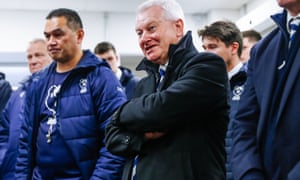The Breakdown | Premiership rugby needs financial fair play now more than ever | Sport
Paul Myners well knows the devastation a financial crisis can cause. He was the finances services secretary to the Treasury when the world recession hit in 2008 and, as he was drawing up his report on the Premiership’s salary cap, sport went into lockdown because of the coronavirus pandemic. He laced his findings with reminders to a business that was already struggling to become sustainable with timely warnings. “Their long-term financial viability was not assured before this moment,” he said of the Premiership clubs. “It is far less so now.”
Lord Myners viewed the cap as a safety valve against unsustainable losses and, although he was too polite to couch it in such undiplomatic language, he clearly viewed the current regulations as a pile of manure, designed neither to ensure nor enforce compliance.
It was not so much the wording he despaired at as the application, with the clubs who drew them up interfering in the disciplinary process and acting primarily out of self-interest. Breaches before the ones that cost Saracens their place in the top flight were covered up and the process was shrouded in secrecy. As ye sow …
The clubs acted like unions in the amateur era, turning their backs on those who were funding the game– television, sponsors and supporters – and regarded their business as private. Small wonder that Myners dropped into his report the suggestion that Premiership Rugby took a look at its corporate governance.
He came up with a series of recommendations that, if implemented, would place a distance between those who drew up the regulations and those who applied them, strengthening the position of the salary cap manager and drawing club officials, players and agents into the group that needed to be held accountable for any breaches.
He urged his reforms be voted on as a package rather than individually, but that is unlikely to happen because one of his recommendations – that the provision for two marquee players who are paid outside the cap be reviewed – has already exposed divisions within the Premiership. The Bristol owner, Steve Lansdown, said this week he would not support a move to end marquee players, nor any bid to reduce the salary cap, which will be £7m until the end of next season.
“It is clear to me, and to many others within clubs, that the marquee players exemption completely cuts across the objectives of equality and competition and creates unhelpful inflationary pressure on wages,” Myners wrote. “The time is ripe for a review of their continued usefulness.”
A number of clubs, including Northampton, Harlequins and Wasps, agree with him as they try to run their clubs at a time when income has reduced to a trickle and no date has been set on the season’s resumption. With matches likely to be played behind closed doors for some time and fears that a second wave of the virus will disrupt next season, they appreciate that controlling costs will be a priority for at least the next couple of years.

The five objectives of the current regulations contain a contradiction that Myners did not highlight. The first three refer to ensuring the financial viability of clubs, controlling inflationary pressures and producing a level playing field, while “enabling clubs to compete in European competitions” is the fifth.
Myners points out English clubs have won the European Champions Cup nine times, more than any other country, although Bath’s success came before the salary cap was introduced in 1999. Saracens’ three came at a time when they were breaking the cap and it could be argued they conquered Europe because they were flouting domestic rules.
Two near-misses in Europe seem to have convinced Saracens the cap regulations did not gear clubs to success in Europe, with teams from France and Ireland enjoying higher playing budgets. Myners points out that last season the cap in France was £2.7m higher than in England, although that gap was reduced by the wages paid to marquee players.
Bristol have set winning the Champions Cup as their ambition and, with the richest Premiership owner behind them, have the means to finance their dream. Their opposition to Myners’ proposal is understandable as they look to fill the hole left by Saracens, but they should not forget where they came from as they bridle at the thought of being bound by “the lowest common denominator”: they were saved from going under by Malcolm Pearce in 1998 and were in trouble again when he stopped investing five years later. Or do Bristol see the future as a European super league?
“Realism needs to come in,” said Pearce then after reflecting on the £9m he had put into the club only to see them back at the bottom of the table. “It [the Premiership] cannot go on as it is and could all come down like a pack of cards.” Seventeen years later, his words echo.
He lamented the owners’ model because it did not foster financial stability, and while Bristol are set fair now it is only because they have Lansdown’s support and drive that they can disregard Myners’ warning. The club’s supporters appreciate how quickly things can change: in December the National League 1 side Old Elthamians found themselves fighting for survival after the death of their main backer, Kobus Paulsen.
Myners referred to the £200,000 a French club receives for every player they have in the national squad. The figure in England is a maximum of £80,000 and if the marquee player provision is abolished, clubs could be rewarded more for the England players they produce. Had the French system been in place, Saracens would have had no need to bend the rules. The current economic climate demands investment in local players, not expensive imports.
• This is an extract from our weekly rugby union email, the Breakdown. To subscribe, just visit this page and follow the instructions.



